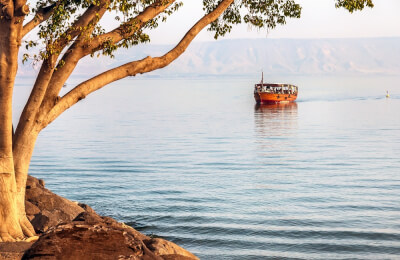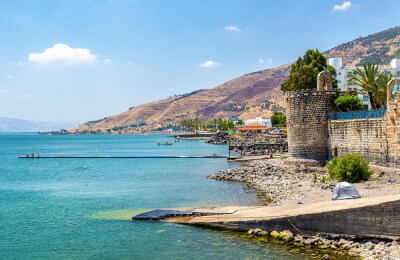
181. Around the Kinneret Promotion
 215₪
215₪
 215₪
215₪
We also found excursions from other cities that are close to your departure city
Other excursions that also deserve your attention
The Historical and Spiritual Significance of St. Peter's Church Tiberias
Located in the heart of Tiberias, a city steeped in history and tradition, St. Peter's Church stands as a beacon of religious history and architectural beauty. This Franciscan church, dedicated to Saint Peter, reflects the deep Christian roots that run through the city, intertwining with the rich tapestry of Jewish and Islamic historical presence. St. Peter’s Church is not only a place of worship but also a site of pilgrimage and a monument bearing witness to the multi-layered past of Tiberias and the Galilee region.
The Biblical Context of St. Peter’s Church
The church is named after Saint Peter, one of Jesus' twelve apostles, and is believed to be located near the site of Peter's house. The New Testament records that Jesus performed miracles in the area and it is here that the resurrection of Jesus is said to have been first witnessed by his disciples. The selection of this site for St. Peter’s Church ties the physical location to the narrative of Christianity, making it a tangible link to the stories of the Bible.
The Architectural Splendor of St. Peter's Church
St. Peter's Church in Tiberias is an excellent example of Ottoman-influenced architecture meshed with traditional Franciscan church designs. Its distinctive facade, ornamental detailing, and the bell tower stand out against the backdrop of Tiberias’ modern structures and ancient ruins. Inside, the church’s interior is adorned with beautiful artwork and religious icons that narrate the life and deeds of Saint Peter, providing a spiritual and visual journey for its visitors.
The Franciscan Custody and Its Role in Tiberias
The Franciscan order has had a significant presence in the Holy Land for centuries and has been instrumental in maintaining Christian holy sites, including St. Peter's Church. Their presence in Tiberias dates back to the 17th century when they established a presence in the city to serve the needs of pilgrims and the local Christian community. Their ongoing work in conserving and promoting the church has ensured its place as a living site of Christian history and worship.
Pilgrimages and Religious Celebrations at St. Peter's Church
St. Peter's Church is a focal point for Christian pilgrimages in Israel, particularly for those following the footsteps of Jesus in the Galilee region. Pilgrims from around the world gather here to reflect, pray, and celebrate Mass. The church's calendar is marked by significant Christian festivities, including the feast of St. Peter and St. Paul, which draw crowds that fill the church and spill into the courtyards, enlivening the ancient city with song and prayer.
The Integration of Nature and Faith
The church is situated near the Sea of Galilee, a significant biblical site where Jesus is said to have walked on water. This proximity to the lake allows visitors to not only engage with the church's religious offerings but also to reflect on the natural beauty of the area that has been the setting for numerous biblical stories. The calm waters of the Sea of Galilee and the serene surroundings provide a tranquil backdrop for meditation and prayer, enhancing the spiritual experience for visitors.
Preservation Efforts and Challenges
St. Peter’s Church, like many historical sites in Israel, faces the challenge of preservation in the face of time and environmental factors. Preservation efforts must balance the need to maintain the church as a place of active worship with the necessity of conserving historical features for future generations. It is a delicate task that requires cooperation between religious authorities, conservation experts, and the Israeli government.
St. Peter’s Church in Modern Tiberias
In a city that has become a blend of old and new, St. Peter's Church represents a touchstone to the ancient world. It is surrounded by modern amenities, including hotels and restaurants catering to tourists, which contrasts yet complements the old-world charm of the church. This juxtaposition offers visitors a multifaceted experience that is both historically rich and comfortably accessible.
The Church as a Cultural Crossroads
The city of Tiberias has always been a mosaic of cultures, and St. Peter’s Church is a symbol of the Christian influence within this mix. The church not only serves as a place of worship but also as a cultural crossroads, where visitors of all backgrounds can learn about the history of Christianity in the region and the broader cultural narratives that have shaped Tiberias and Israel as a whole.
The Impact of St. Peter’s Church on Local and International Communities
The influence of St. Peter’s Church extends beyond its walls, impacting both the local community and international visitors. It plays a role in the spiritual life of local Christians and contributes to the religious diversity of the city. For the international community, the church is a symbol of the enduring Christian presence in the Holy Land and serves as a testament to the religious pluralism that characterizes the region.
The Future of St. Peter’s Church
Looking towards the future, St. Peter's Church stands as a guardian of the past and a beacon for the future. As Tiberias continues to grow and develop, the church will continue to adapt, finding new ways to engage with both the faithful and the curious. It stands ready to welcome all who come seeking knowledge, solace, or a connection with the deep spiritual history of this sacred land. In conclusion, St. Peter's Church in Tiberias is not just a religious site but a historic landmark that captures the essence of faith, history, and architecture in Israel. Its walls echo with the prayers of centuries, and its doors remain open to all who seek to uncover the layers of history and spirituality that it preserves. From the impact of its biblical ties to its architectural beauty, from its significance as a site of pilgrimage to its role in the Franciscan custody, St. Peter’s Church is an integral chapter in the story of Tiberias and the Holy Land.

